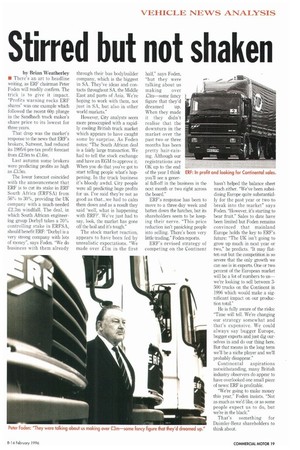Stirred but not shaken
Page 21

If you've noticed an error in this article please click here to report it so we can fix it.
by Brian Weatherley
• There's an art to headline writing, as ERF chairman Peter Foden will readily confirm. The trick is to give it impact. "Profits warning rocks ERF shares" was one example which followed the recent 60p plunge in the Sandbach truck maker's share price to its lowest for three years.
That drop was the market's response to the news that ERF's brokers, Natwest, had reduced its 1995/6 pre-tax profit forecast from £2.6m to £1.6m.
Last autumn some brokers were predicting profits as high as .£35m.
The lower forecast coincided with the announcement that ERF is to cut its stake in ERF South Africa (ERFSA) from 56% to 30%, providing the UK company with a much-needed .£2.3m windfall. The deal, in which South African engineering group Dorbyl takes a 70% controlling stake in ERFSA, should benefit ERF: "Dorbyl is a very strong company with lots of money", says Foden. "We do business with them already
through their bus bodybuilder company, which is the biggest in SA. They've ideas and contacts throughout SA, the Middle East and parts of Asia. We're hoping to work with them, not just in SA, but also in other world markets."
However, City analysts seem more preoccupied with a rapidly cooling British truck market which appears to have caught some by surprise. As Foden notes: "The South African deal is a fairly large transaction. We had to tell the stock exchange and have an EGM to approve it. When you do that you've got to start telling people what's happening. In the truck business it's bloody awful. City people were all predicting huge profits for us. I've said they're not as good as that...we had to calm them down and as a result they said 'well, what is happening with ERF?'. We've just had to say, look, the market has gone off the boil and it's tough."
The stock market reaction, appears to have been fed by unrealistic expectations. "We made over Lim in the first half," says Foden, "but they were talking about us
making over .C3in—sorne fancy figure that they'd
dreamed up. When they made it they didn't realise that the downturn in the market over the past two or three months has been pretty hair-raising. Although our registrations are OK up to the end of the year I think you'll see a general fall-off in the business in the next month or two right across the board."
ERF's response has been to move to a three-day week and batten down the hatches, but its shareholders seem to be keeping their nerve. "This price reduction isn't panicking people into selling. There's been very little trading," Foden reports.
ERF's revised strategy of competing on the Continent hasn't helped the balance sheet much either. "We've been subsidising Europe quite substantially for the past year or two to break into the market" says Foden. "However, it's starting to bear fruit." Sales to date have been limited but Foden remains convinced that mainland Europe holds the key to ERF's future: "The UK isn't going to grow up much in next year or two," he predicts. "It may flatten out but the competition is so severe that the only growth we can see is in exports. One or two percent of the European market will be a lot of numbers to us— we're looking to sell between 3500 trucks on the Continent in 1996 which would make a significant impact on our production total."
He is fully aware of the risks: "Time will tell. We're changing our strategy somewhat and that's expensive. We could always say bugger Europe, bugger exports and just dig ourselves in and do our thing here. But that means in the long term we'll be a niche player and we'll probably disappear."
Continental aspirations notwithstanding, many British industry observers do appear to have overlooked one small piece of news: ERF is profitable.
"We're going to make money this year," Foden insists. "Not as much as we'd like, or as some people expect us to do, but we're in the black."
That's something for Daimler-Benz shareholders to think about.




































































































